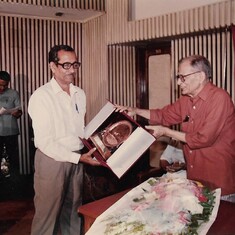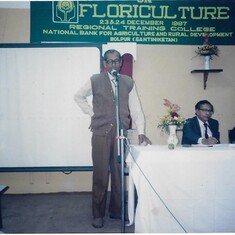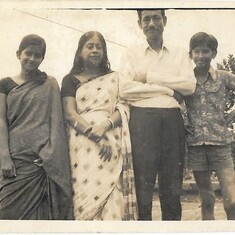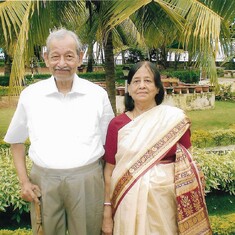This memorial website was created in memory of our loved one, Radhagobinda Maiti , who was born on September 1, 1932 and who passed away on January 8, 2019. We will remember him forever.
To know more about his life, please see the "Life" section.
Here is a small sample of his many writings (in Bengali, free to download):
1) Village Magazines
2) Rose
To know more about his life, please see the "Life" section.
Here is a small sample of his many writings (in Bengali, free to download):
1) Village Magazines
2) Rose
Tributes
Leave a tribute
January 8, 2023
January 8, 2023
Remembering Baba, who shaped my life in every possible way. Always with his own actions as examples, never ever with coercion
September 1, 2021
September 1, 2021
That was a life well-lived. Hope we can do the same too...
September 1, 2020
September 1, 2020
I really missed you in my every thought and activity. Rest in peace.
September 1, 2020
September 1, 2020
Miss your smiling eyes...
January 8, 2020
January 8, 2020
Today marks one year of passing of a man whose life was marked by four beautifully intertwined threads: Knowledge, Ability, Kindness and Joy.
January 13, 2019
January 13, 2019
Miss you, Kaku.
January 13, 2019
January 13, 2019
I came to know Professor R.G. Maiti not as the well-respected professor or the active scientist in his field that he was, but as the father of my friend. There too, he left a deep impression on my teen-age mind. At an age where we generally maintained a distance from the adults, kaku had the unique quality of approaching the youngsters with a disarming smile and engaging in conversations on topics that usually burden young minds but often dismissed by adults. It was a treat to see and listen to him engage my friends in discussion on Gita, Rabindrasangeet, evolution and topics farther afield. To the young, insecure minds, eager to gain credence in an adult world, this was priceless reassurance and affirmation. As I grew up, I even engaged in more contentious debates with kaku, so much so that once I came back to apologize. To my relief, he didn't even remember the incident, or may be pretended not to. That was kaku. Kaku would probably have been the first one to say that we have one life and that we should live it well. Kaku exemplified that in his life. We are poorer for not having him among us anymore, but at the same time we should consider ourselves fortunate to have come in his contact at all. May kakima, Susmita-di and her family, Sudipta and his family, other members of Kaku's extended family and friends find some solace in the memories of a full life well-lived. Please accept our condolences.
January 12, 2019
January 12, 2019
Today I want to share some very personal memory of Prof. Radhagobinda Maiti here. I usually donot share much of my personal memories but for Prof. Maiti my heart tells me to speak about him.
To me I always knew him as Maiti Jethu since my childhood. According to my thakurma (grandmother) and baba (father) he was like my fathers older brother, thats why I call him ‘Jethu’.
My early memories about him was mostly in ‘cha- er- adda’ (evening gathering with tea) with thakurma (grandmother) and dadu (grandfather) on Saturday and Sundays.
Apart from all funfilled childhood memories the most prominent thing that I remember about him was during the time when my baba was posted in North Bengal and ma and I was in Kalyani home. As a growing teen at that time I was just learning to maneuver the world in my own way, but Maiti Jethu never forgot to knock the door and ask ’sab thik ache to?’ He was so kind that he not only ask about me but also my pet ‘Kuttush’ (a german shepherd)..’are you taking him to vet timely?’ He taught me many small details about gardening and taking care of plants. During my morning walk with kuttush sometimes he will join me and ask’how is your school is everything fine there?’ He was always very polite and caring person to any human being.
Today when I write about him my mind goes back to Kalyani and the words donot stop. But I will stop here and only say one thing that a bunch of flower looks much beautiful than a single flower in a vase.
To me he was that kind of person whose kindness and gratefulness towards the society is like a bunch of flower which me and my family will remember forever.
To me I always knew him as Maiti Jethu since my childhood. According to my thakurma (grandmother) and baba (father) he was like my fathers older brother, thats why I call him ‘Jethu’.
My early memories about him was mostly in ‘cha- er- adda’ (evening gathering with tea) with thakurma (grandmother) and dadu (grandfather) on Saturday and Sundays.
Apart from all funfilled childhood memories the most prominent thing that I remember about him was during the time when my baba was posted in North Bengal and ma and I was in Kalyani home. As a growing teen at that time I was just learning to maneuver the world in my own way, but Maiti Jethu never forgot to knock the door and ask ’sab thik ache to?’ He was so kind that he not only ask about me but also my pet ‘Kuttush’ (a german shepherd)..’are you taking him to vet timely?’ He taught me many small details about gardening and taking care of plants. During my morning walk with kuttush sometimes he will join me and ask’how is your school is everything fine there?’ He was always very polite and caring person to any human being.
Today when I write about him my mind goes back to Kalyani and the words donot stop. But I will stop here and only say one thing that a bunch of flower looks much beautiful than a single flower in a vase.
To me he was that kind of person whose kindness and gratefulness towards the society is like a bunch of flower which me and my family will remember forever.
January 10, 2019
January 10, 2019
Thank you for visiting this page created in memory of Prof. R. G. Maiti. If you would like to leave a condolence message on this website, please send it by email to sudipta.maiti@gmail.com
Please use "condolence message" as the subject heading, and give your full name, phone number, and how you knew him at the end of the message. Thank you.
Namita Maiti (wife), Susmita Ghosh (daughter), Sudipta Maiti (son), Arupratan Ghosh (son in law), Dipanwita Maiti (daughter-in-law) and other family members
Please use "condolence message" as the subject heading, and give your full name, phone number, and how you knew him at the end of the message. Thank you.
Namita Maiti (wife), Susmita Ghosh (daughter), Sudipta Maiti (son), Arupratan Ghosh (son in law), Dipanwita Maiti (daughter-in-law) and other family members
Leave a Tribute
Recent Tributes
January 8, 2023
January 8, 2023
Remembering Baba, who shaped my life in every possible way. Always with his own actions as examples, never ever with coercion
September 1, 2021
September 1, 2021
That was a life well-lived. Hope we can do the same too...
September 1, 2020
September 1, 2020
I really missed you in my every thought and activity. Rest in peace.
Gallery
Receiving one of his multiple Awards


During one of his speeches


With his Family


With his wife in Goa - 2009




